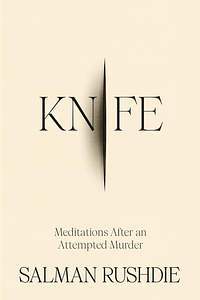Take a photo of a barcode or cover
emotional
reflective
slow-paced
dark
emotional
hopeful
reflective
sad
medium-paced
This book reminded me that we can choose how we respond, even to brutal, shocking, life-altering events.
emotional
hopeful
reflective
medium-paced
How and why would a 24-year old New Jersey man, who never read any of Rushdie’s books want to become the assassin known for fulfilling Ayatollah Khomeini’s fatwa? Indoctrination by a YouTube Tube Imam. That’s how. The why is more difficult…
Rushdie almost died when he was attacked on stage just before he was scheduled to give a talk in Chautauqua, NY, ironically, about safe havens for exiled writers. His assailant rushed to the stage and attacked him with a knife, stabbing him 10 times. Rushdie knew when he saw his attacker coming that this was the moment of his death. Yet it wasn’t. He lost the use of one eye and one hand, but he survives and continues to write.
In his memoir Rushdie looks both inward and outward, examining the why of the attack, which occurred thirty-four years after the fatwa’s issuance, (Khomeini also did not read “The Satanic Verses”) and the how of Rushdie’s response to the attack, continuing to be an independent and powerful literary voice in the face of such absolute hate. Rushdie sets up an imaginary discourse with the would-be assassin and relives the brutal attack. He also details his long healing process and his family’s unwavering love and support. The why remains. It was and will continue to be an attack on freedom of expression and individual liberty.
Rushdie almost died when he was attacked on stage just before he was scheduled to give a talk in Chautauqua, NY, ironically, about safe havens for exiled writers. His assailant rushed to the stage and attacked him with a knife, stabbing him 10 times. Rushdie knew when he saw his attacker coming that this was the moment of his death. Yet it wasn’t. He lost the use of one eye and one hand, but he survives and continues to write.
In his memoir Rushdie looks both inward and outward, examining the why of the attack, which occurred thirty-four years after the fatwa’s issuance, (Khomeini also did not read “The Satanic Verses”) and the how of Rushdie’s response to the attack, continuing to be an independent and powerful literary voice in the face of such absolute hate. Rushdie sets up an imaginary discourse with the would-be assassin and relives the brutal attack. He also details his long healing process and his family’s unwavering love and support. The why remains. It was and will continue to be an attack on freedom of expression and individual liberty.
emotional
reflective
medium-paced
Graphic: Violence, Medical content, Injury/Injury detail
Moderate: Death, Hate crime, Religious bigotry
Minor: Cancer
emotional
reflective
tense
medium-paced
I knew so little about Salman's writing or the event before. Interesting read; sent me down the rabbit hole.
challenging
reflective
medium-paced
challenging
emotional
inspiring
reflective
medium-paced


